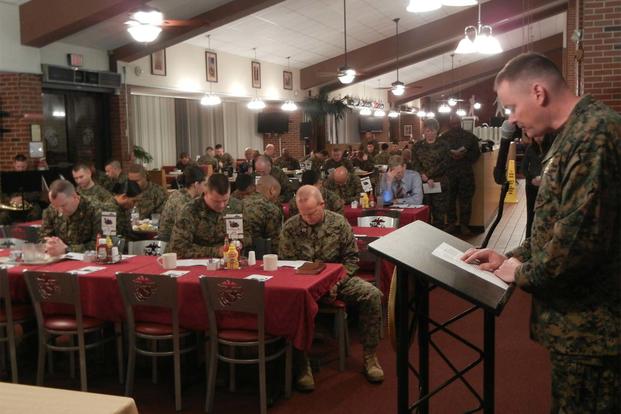The Marine Corps is quietly rolling out a new initiative aimed at building Marines who are fit spiritually as well as physically.
In coming months, discussions about spiritual fitness and making moral choices will be part of the curriculum at the Corps' Officer Candidates School in Quantico, Virginia, and at corporals' and sergeants' courses around the service, Rear Adm. Brent Scott, chaplain of the Marine Corps, told Military.com in an interview.
The service hasn't ruled out making spiritual fitness a part of boot camp as well, he said.
Scott said he began planning this initiative when he arrived at his post two years ago, after reflection on the qualities that make a Marine resilient on the battlefield.
"We're now at the tail end of what was a long war in Iraq and Afghanistan. We found that much of the resilience we saw was not necessarily attributed to something that somebody could do in the gym," he said. "A lot had to do with the heart and soul of the individual."
Spiritual does not necessarily mean religious, Scott clarified. He breaks spiritual fitness into three parts: personal faith, personal values, and moral living and decision-making.
"A moral compass doesn't just come from a faith foundation; it's not enough to make a decision based on what is legally right or wrong," Scott said. "Chaplains will help Marines discover that compass for themselves -- that center of gravity that comes from their own upbringing, personal experiences, and religious teaching."
As a first line of effort, Scott said, his office is creating discussion guides around a book on the commandant's professional reading list: "What It Is Like to Go to War," by Navy Cross recipient Karl Marlantes, a Marine veteran of the Vietnam War.
In the 2011 book, Marlantes describes in moving detail his journey to find spiritual absolution and peace, and his struggle with moral injury sustained in war, decades after returning home from Vietnam. He describes various ceremonies and rituals ancient cultures observed as they welcomed warriors back into society, acknowledging the transition from war to peace that must take place.
"We should allow people to curse the dead for murdering their friends, and then, if the younger ones can't, the older ones, officers and NCOs, should be trained in conducting the rituals of forgiveness and healing," Marlantes writes. "Something like: 'Bless these dead our former enemies who have played out their part. … Bless us who [live], whose parts are not yet done. … Forgive us if we killed in anger or hatred. Forgive them if they did the same. Judgment is Yours, not ours. We are only human."
Scott said two sets of discussion prompts are being designed with this book in mind: one for conversations between chaplains and Marines, and one for Marine leaders working directly with subordinate troops.
Spiritual fitness elements of the OCS and NCO professional military education curricula are still being developed, Scott said, but they will emphasize "kneecap to kneecap" discussions, rather than classroom instruction.
Close to the Marine Corps birthday on Nov. 10, the service will release a video featuring Scott, Commandant Gen. Robert Neller and Sergeant Major of the Marine Corps Ronald Green talking about the importance of spiritual fitness.
This initiative will be proved successful, Scott said, if Marines begin talking about spiritual fitness and maintaining spiritual health as openly as they discuss physical fitness and physical training.
"If all you have to do is look within yourself, that runs kind of bankrupt over a period of time," Scott said. "Marines face mortality, life and death, and that's when those faith issues start to come up."
-- Hope Hodge Seck can be reached at hope.seck@military.com. Follow her on Twitter at@HopeSeck.






























